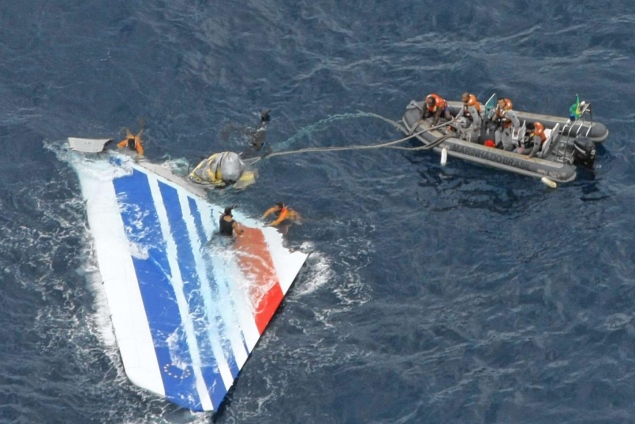
Le Bourget (France), July 6: A combination of faulty sensors and mistakes by inadequately trained pilots caused an Air France jet to plunge into the Atlantic Ocean in 2009, killing all 228 people aboard in the airline's deadliest ever crash, French investigators said on Thursday.
Investigators are urging better instruction for pilots on flying manually at high altitudes and stricter plane certification rules as a result of a three-year investigation into what happened to Flight 447.
Airbus, manufacturer of the A330 plane, said in a statement that it is working to improve speed sensors known as pitot tubes and making other efforts to avoid future such accidents. Air France stressed the equipment troubles and insisted the pilots "acted in line with the information provided by the cockpit instruments and systems. .... The reading of the various data did not enable them to apply the appropriate action."
But the Bureau for Investigations and Analysis' findings raised broader concerns about training for pilots worldwide flying high-tech planes when confronted with a high-altitude crisis.
The report also could have legal implications: A separate French judicial investigation is still under way, and Air France and Airbus have been handed preliminary manslaughter charges.
The bureau's analysis lists a combination of "human and technical factors" behind the crash. The plane flying from Rio de Janeiro to Paris slammed into the sea during a nighttime thunderstorm on June 1, 2009.
Some families of victims felt investigators didn't focus hard enough on the equipment problems, saying the two pilots at the controls were doing what they could while faced with a barrage of inaccurate information.
Ice crystals that blocked the pitot tubes were the "unleashing event" that set off the plane's troubles, chief investigator Alain Bouillard said. The plane's autopilot shut off and the co-pilots had to fly manually, while a succession of alarms were going off. The captain was on a rest break.
In one fatal decision, the report says, one of the co-pilots nosed the Airbus A330 upward during a stall - instead of downward, as he should have - because of false data from sensors about the plane's position. Mr Bouillard said that was an "important element" of the cause of the crash.
He said the two pilots at the controls never understood that the plane was in a stall. He said only a well-experienced crew with a clear understanding of the situation could have stabilized the plane in those conditions.
"In this case, the crew was in a state of near-total loss of control," Mr Bouillard said.
Robert Soulas, who lost his daughter and son-in-law in the crash, says investigators said the flight director system indicated the "erroneous information" that the plane was diving downward, "and therefore to compensate, the pilot had a tendency to pull on the throttle to make it rise up."
However, the plane was in a stall instead. A basic maneuver for stall recovery, which pilots are taught at the outset of their flight training, is to push the yoke forward and apply full throttle to lower the nose of the plane and build up speed. But because the pilot thought the plane was diving, he nosed up.
Some families of people who died in the crash showed sympathy toward the pilots, saying they were dealing with bad equipment in an exceptionally challenging situation.
Mr Soulas noted that manufacturers had known for years about problems with the plane's speed sensors freezing over, but didn't order the faulty models systematically replaced until after the crash.
Pilot Gerard Arnoux said, "A normal pilot on a normal airliner follows" the signals on the flight director system, which tells them to go left, right, up or down.
Central to this accident is the fact that when the automation failed, the pilots were presented with conflicting information which was obviously incorrect, said William Voss, president of the Flight Safety Foundation in Alexandria, Virginia. But they were unable to look through this and understand what the aircraft was actually doing.
"Pilots a generation ago would have done that and understand what was going on, but (the AF447 pilots) were so conditioned to rely on the automation that they were unable to do this," he said.
"This is a problem not just limited to Air France or Airbus," Mr Voss said. "It's a problem we're seeing around the world because pilots are being conditioned to treat automated processed data as truth, and not compare it with the raw information that lies underneath."
The final report included a study of the plane's black box flight recorders, uncovered in a costly and extraordinarily complex search in the ocean depths.
Lais Seba, the mother of 31-year-old victim Luciana Clarkson Seba, said "it's going to be forever difficult" for survivors to deal with the loss of their loved-ones.
"We are surviving," she said. "We live one day at a time, with lots of pain, and always missing her."





Comments
Add new comment